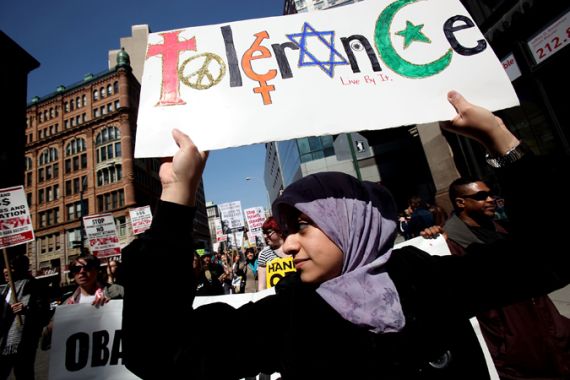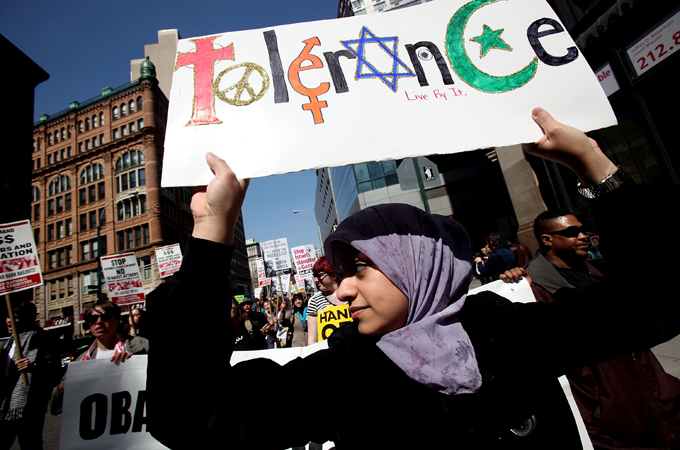For Western Muslims, bin Laden died long ago
The past decade has seen widespread empowerment of Muslims questioning their identity and role in the global community.

 |
| Many Muslims in the West have excluded the ideologies of Osama bin Laden in their practise, thus making him effectively dead for them years ago [GALLO/GETTY] |
The response to the death of Osama bin Laden was celebratory, in some quarters even ecstatic. President Barack Obama’s initial statement was much more measured, however, not wanting to appear to gloat. But his restraint was never going to be enough to prevent US citizens spilling out on to the streets to express their relief and utter joy at the death of a man who had become the icon for “global terrorism”.
The events of 9/11, watching two jumbo jets slice through vertical steel structures tens of storeys high, will remain a horror in our collective memory. Even for people thousands of miles away with no blood relation to those who lost their lives, the scars run deep, many yet to heal. In this context, the response of some in the US to the death of their longstanding tormentor is contextually explainable. Nevertheless, their response belies the fact that bin Laden’s influence on a global level has never been more than at the margin of the margins, and had been dealt the ultimate death blow by the “Arab Spring”.
In the last past few weeks, reams have been written to give us a greater understanding of the geopolitical consequences of bin Laden’s death. The voice that remains unheard and offers a missing perspective is that of the grassroots Muslim communities of Britain, for whom the realities of day-to-day life has been reformed in the past decade.
The connotation here is far from a negative one. Since the events of 9/11, Western Muslims I have met have been asked sobering questions about issues at the very heart of their faith – as well as around belonging, loyalties and identity. Whilst some have been defensive about such queries, exclaiming that Muslims have nothing to prove, the majority have recognised these questions as legitimate, and embraced the chance to respond, wanting to taking a greater responsibility in shaping the future of their communities. Perhaps unexpectedly, answering these questions has given Muslims the opportunity to think critically and challenge cultural and idealogical traditions. More importantly, it has forced incredibly deep introspection leading to the evolution of Muslim communities – which in turn has served to strengthen the hand of moderates.
We are now beginning to see the emergence of a confident, critically developing and articulate generation of Western Muslims. A generation that wants to break free from perpetual caricatures and one that has accelerated its own development. Individuals who are at home in the West and are comfortable in their own skin, able to communicate and interact, fully integrated in their homeland. These are people who equally reject the victim mentality and the myth of return – and are able to remain consistent in their condemnation of wrongs committed by their co-religionists or by their fellow citizens or by their elected governments. Most importantly, this generation of Muslims is making palpable contributions to civic society in numerous fields, at the very highest of levels.
While the religious context for bin Laden’s extreme rhetoric never gained much traction, the resonating cacophony of condemnation has only amplified. Scholars of Islam, grounded in traditional learning, have come together as never before in a modern context to speak with one clear authoritative and credible voice against bin Laden’s mantra. The source of these rebuttals has varied and has included religious institutions and boards of scholars. Last year saw the publication of the 600 page “Fatwa on Terrorism”, which has been almost unanimously praised. Furthermore, through their continued use of the internet and social media, scholars such as Tariq Ramadan continue to see their popularity increase exponentially. Indeed, many of the Muslims making the greatest strides in mainstream society would consider themselves to be the students of Ramadan and his ilk.
On an organisational level, much change has also occurred. Ten years ago, there were few Muslim organisations, and those that did exist were given carte blanche in their activities. For most, that has now changed. Many organisations at the fore of Muslim communities have had their very existence questioned and those that were deemed not fit for purpose have fallen. Other organisations, whose ideologies and cultures were never relevant to their Western context or to their indigenous membership have had to evolve at break-neck speed. Whilst existing organisations have developed and chosen to redefine themselves, new organisations have been born.
Not only is this healthy competition, a welcome consequence has enabled Muslims not to be self-perceived as a homogeneous group identifying as a monolith, but rather as diverse citizens, united in faith; as communities, not a singular community. Indeed, today, external stakeholders no longer see Muslims as having one representative voice, but rather as being a group of individuals with their own thoughts, beliefs and emotions.
While, for many, such change has proven to be a bitter pill to swallow, it has nevertheless been a healthy course that Muslims have responded well to. All of this has occurred, despite the spectre of bin Laden in the background, and his attempts to shape every day since 9/11 to bring about his unique brand of the “clash of civilisations”. Bin Laden became largely irrelevant a long time ago, and to think that his death would be the global event that it would have been ten years ago, is to mistakenly assume that the world has not changed greatly since then.
The past decade will be remembered more as a catalyst that transformed Muslim communities; the fruits of this transformation are not solely being felt today, but the same critically minded young people that I have seen in recent years will emerge in the next decade as leaders. For the grassroots, the wars have only strengthened our resolve to participate at all levels; the Arab spring has given a new confidence. Far from the dream that bin Laden ever envisioned, it is an exciting time to be a Western Muslim, and the progress that has been made is, though not complete, remarkable. Indeed, Muslims have shown through their progression that Osama bin Laden didn’t die last week, but in our collective imagination, he died many years ago.
Wakkas Khan has been an advisor to a number of government departments including the Department for Communities and Local Government. He is a founding member of the Radical Middle Way Project.
The views expressed in this article are the author’s own and do not necessarily reflect Al Jazeera’s editorial policy.
